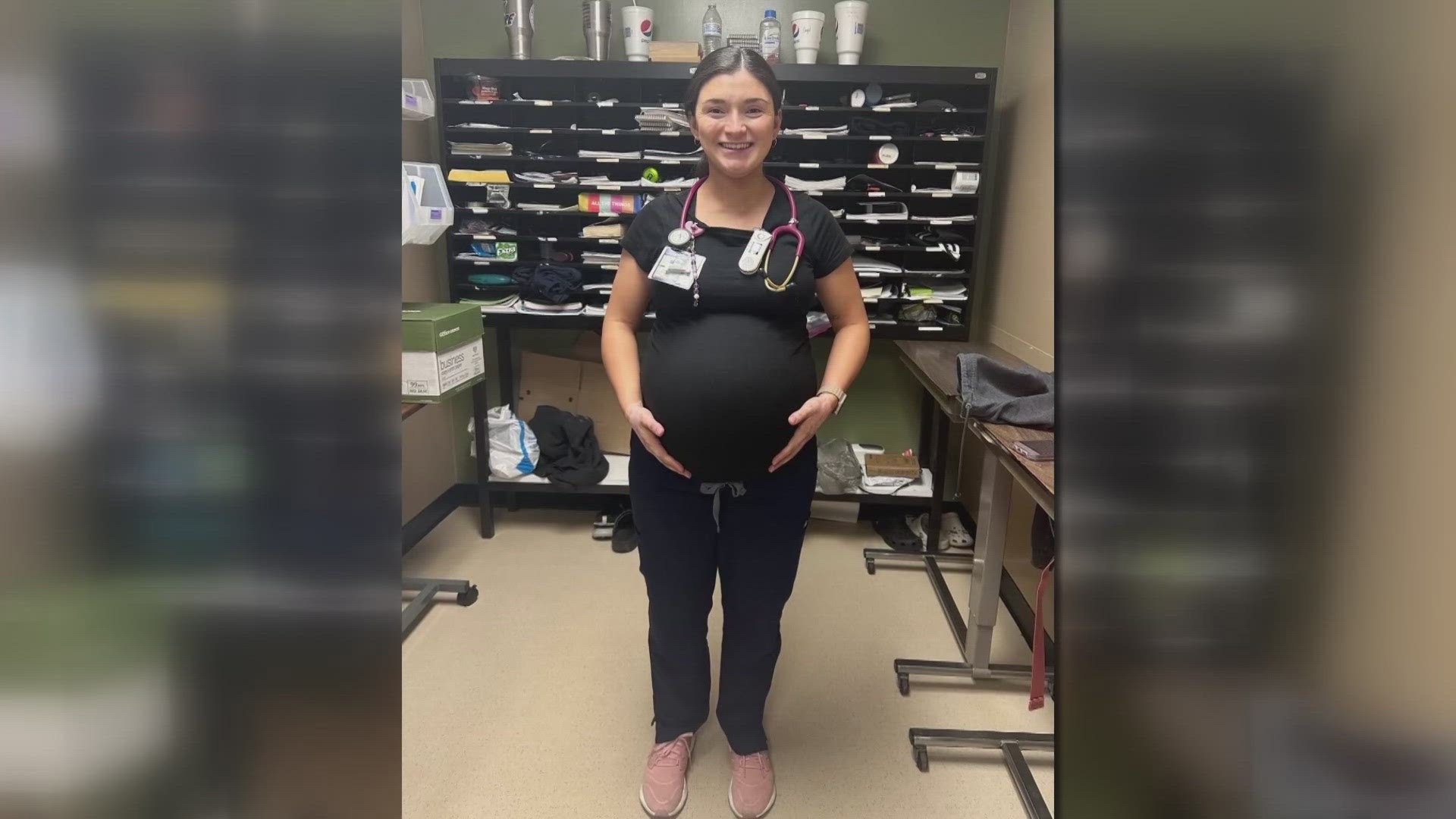PHOENIX — An Arizona midwife who oversaw a home birth in December where the mother and infant both died met with state health officials Wednesday. Arizona's Department of Health Services issued the midwife, Sarah Kankiewicz, a notice of intent to revoke her license back in March and Wednesday's meeting was a settlement conference to discuss her license.
But as ADHS faces criticism for a lack of transparency, a spokesperson declined to provide information about Wednesday's meeting and the future of Kankiewicz's license.
"We do not have someone available for an interview at this time. We are in talks with the licensee, Sarah Kankiewicz, about potential settlement terms," a spokesperson said in an email.
12News has talked to multiple women who worked with Kankiewicz. One woman's baby died. Another woman's baby was stillborn and had to be resuscitated in a hospital.
Complaints date back to 2020
In 2020, Heather Flowers opted for a home birth. She had had a hospital birth with her first daughter and wanted more control over the process.
She decided to work with Kankiewicz as her midwife. Kankiewicz became a licensed midwife in Arizona in early 2020, months before Flowers went into labor.
Flowers' baby was 11 pounds. She had an extreme laceration. As she was tearing, records show the midwife did not check her vitals enough, did not follow the required emergency plan, and downplayed her laceration.
Flowers' birth was botched and she still deals with the physical effects today. She considers herself and her baby lucky to be alive.
“I trusted her. She's supposed to be the professional, and it just wasn't the case," Flowers said.
Flowers filed a complaint against Kankiewicz with ADHS. The investigation found multiple citations.
Her complaint was the first but not the last.
More citations before Jordan Terry's death
Kankiewicz received multiple civil penalties for failing to submit required paperwork for more than a dozen patients.
ADHS gave her huge financial breaks on those penalties.
Still, another complaint resulting in citations came in 2023.
In that case, Kankiewicz failed to conduct enough prenatal visits. She failed to assess the condition of the mother and the baby during labor. She continued with home birth services even after the mother was diagnosed with hypertension, a violation of her scope of practice.
It's unclear what happened to the mother and baby in that case because it's not documented in the state's report.
Jordan and Mack Terry: The third case
Tragedy struck twice on Dec. 17, 2023.
Parker Terry's pregnant wife, Jordan, and their newborn baby boy, Mack, both died after their home birth in Safford, Arizona that was overseen by Kankiewicz.
A state investigation found Kankiewicz failed to do necessary vital checks. She did not enact her emergency plan in time, even after Jordan's lips turned blue.
The state also found the home birth shouldn't have been approved by Kankiewicz in the first place. Jordan had previously had a cesarean delivery and a blood transfusion. Under state regulations, midwives cannot perform home births under those circumstances.
Parker was the one who rushed his wife and baby to the hospital. Jordan had a uterine rupture and she and the baby did not survive.
He wishes he knew about the others who came before them.
“The processes in which you research a midwife are incredibly difficult," Parker Terry said.
The complaint stemming from Jordan and Mack's deaths resulted in five ADHS citations, however the state's records do not tell the full story.
If a future family looking to find a midwife read the report, they would never know anyone died, let alone two people.
RELATED: Arizona intends to revoke her midwife license, but she's been allowed to practice in the meantime
Former ADHS director recalls scope of practice changes for midwives
Will Humble was the state's health director when the scope of practice for midwifery was expanded. Midwives used to be prohibited from conducting VBAC births, or vaginal birth after cesarean delivery, in Arizona.
There was a strong push to change that. Humble recalls it wasn't an easy decision.
"We had the home birth enthusiasts and the midwives pushing for an expanded scope of practice to include VBAC. And on the other side, we had OBGYNs who had spent years in medical school and then a residency practicing how to manage births, including VBACs," Humble recalled. "And they thought it was just outrageous that midwives, who had almost no medical training, really hadn't been a medical school, that they would be allowed to do this practice."
Ultimately, after extensive research, Humble said the state sided with midwives. They did, however, add additional criteria and limitations for VBACs to try to minimize risk.
“If the midwife doesn't follow those criteria, the risks go from manageable to extreme. Same goes for the agency. If the state agency isn't doing a good job overseeing the midwives, those risks go from manageable to really, really bad," Humble said.
Humble said transparency from the health department is critical to ensure parents are making the best and safest decision for their family.
“The health department has two-fold responsibility. Number one, to hold the midwives to the letter of their regulations and to ensure that there's disciplinary action when those criteria aren't being met. The second piece is to make that information known," Humble said.
State declines to release information about Kankiewicz
After ADHS issued the notice of intent to revoke Kankiewicz's midwife license back in March, she was allowed to continue practicing.
Recently, she posted online suggesting she will continue her practice privately.
It's unclear what the next step in the state's settlement talks with Kankiewicz is, but according to their website, her license remains active.
>> Download the 12News app for the latest local breaking news straight to your phone.
UP TO SPEED
Catch up on the latest news and stories on our 12News YouTube playlist here.

